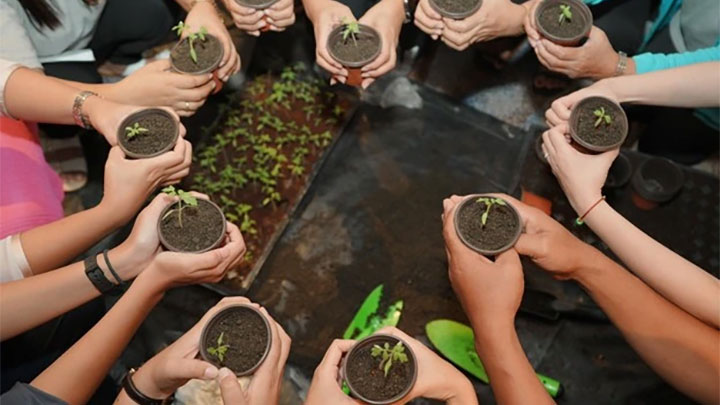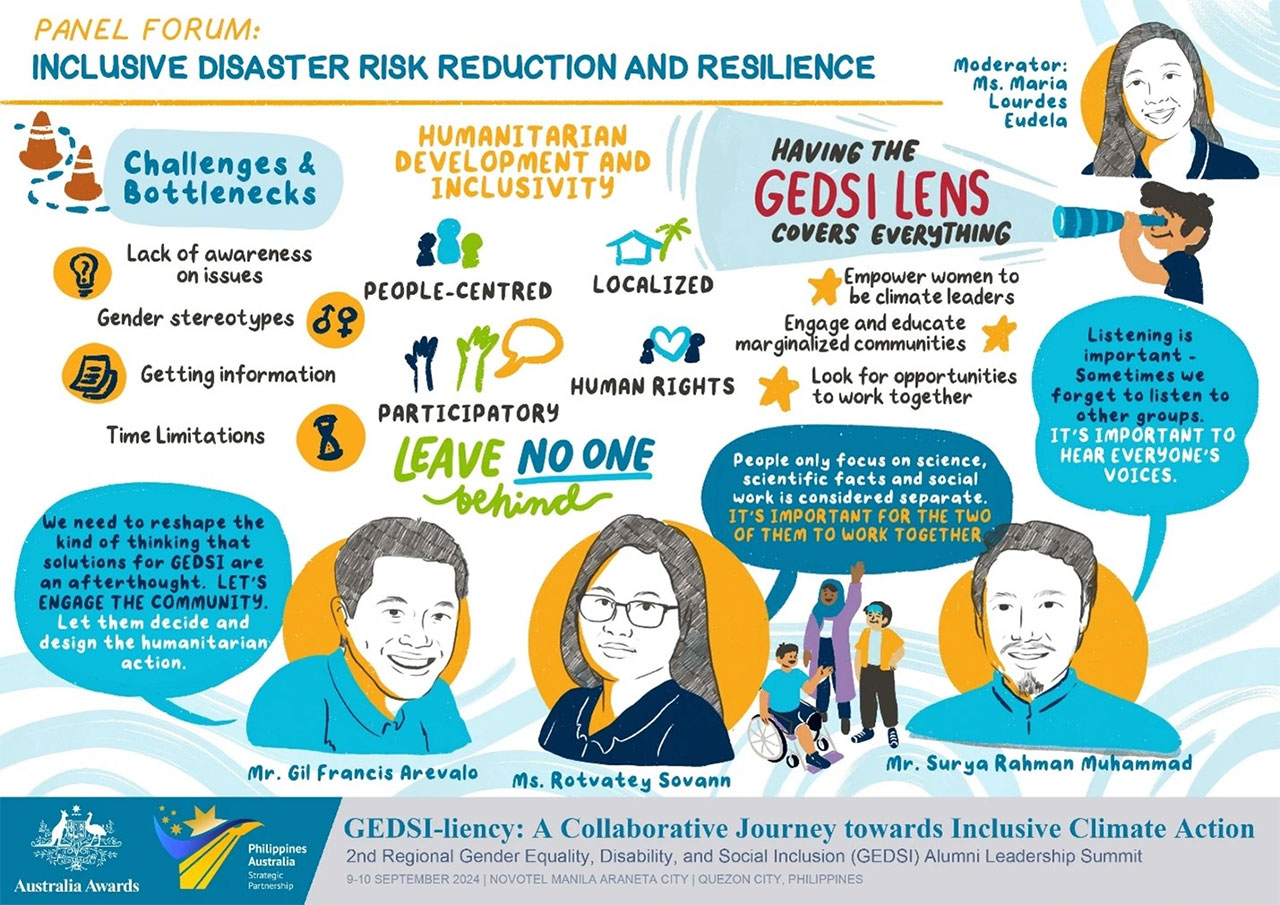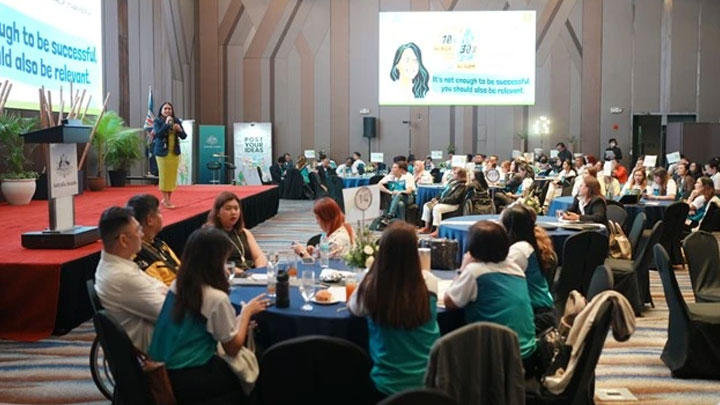
Collaborating at the intersection of Gender Equality, Disability and Social Inclusion (GEDSI) and climate change.
More than 140 Australia Awards alumni from 11 countries across Asia and the Pacific came together in the Philippines capital, Manila to connect, collaborate and share their knowledge on the intersection of Gender Equality, Disability and Social Inclusion (GEDSI) and climate change.
Held in September, the occasion marked the second Regional, and the first in-person iteration of the event. The inaugural Summit took place during COVID-19, with the Australia Awards Alumni Engagement Philippines team employing some clever technology to support virtual connection and collaboration.
The Summit is a catalytic event, aiming to spark ideas, foster knowledge-sharing and create networks between talented leaders, thinkers and champions for inclusion. It contributes directly to Australia’s international development priorities of advancing gender equality and disability inclusion and supporting local leadership.
Climate change impacts on GEDSI
This year, the event focused on one of the Indo-Pacific’s most pressing issues – climate change. As demonstrated by the Development Intelligence Lab’s Pulse Check series, changing climate and the natural environment is considered the number one disruption to development across many countries in Southeast Asia. This is reflected in the Pacific. The Pacific Islands Forum Kainaki II Declaration for Urgent Climate Action Now has established the need for global solidarity to overcome the climate change crisis and safeguard the survival of the Blue Pacific into the future.
Recognising the urgent need for action, the Summit focused on the theme of GEDSI-liency: A Collaborative Journey towards Inclusive Climate Action. Aiming to foster dialogue on inclusive actions that will help build resilient communities, it hosted keynote speeches, panel discussions, knowledge exchange and interactive learning excursions. The latter saw alumni visiting partner organisations and alumni-led programs that support GEDSI and community resilience, with some getting much-appreciated hands-on experience.
We had the pleasure of attending the event and collaborated with alumni and Tetra Tech International staff members, Thao Dam (Deputy Director, Aus4Skills Vietnam), Hien Nguyen (GEDSI Coordinator, Aus4Skills Vietnam), Shaheen Nisha (Biomedical Engineering Improvements Officer, Fiji Health Program) and Rioli Deldeab Deduna (Director for Disability Affairs, Government of Nauru) to compile some key reflections from the Summit.
Person-centered approaches are vital
The need for person-centered approaches was a key theme of the Summit. First raised in the panel discussion on day one, we also discussed the need to partner with representative organisations (like organisations of persons with disability), draw on lived experience, and create opportunities for equitable engagement with communities in our knowledge exchange sessions.

Hien’s reflections echoed this:
“All the different panels from the Summit all highlighted the importance of leaving no one behind and acknowledged diverse lived experiences. Only when the communities we are serving are also involved in proposing the solutions to their specific needs, can we work towards ensuring that [disaster risk reduction] efforts are participatory and cause no harm.”
Building on this, Thao underlined the need for more focused learning in this area:
“We all know that to effectively support people with disability, their voices must be included in decision-making processes, and this can be achieved by integrating disability perspectives into all climate-related programs instead of treating them as separate issues. However, determining how to implement this integration within each program remains a critical question that requires further exploration.”
Reflecting on this, we see an opportunity to bring people with lived experience of marginalisation and disasters into panel discussions like these to strengthen learning opportunities for participants.
Finally, Shaheen reflected on the issue of focusing on participation rather than genuine empowerment, and the tendency for GEDSI efforts to focus on gender (AKA women):
“…one of my key takeaways [from the panel discussion] was the statement: ‘Working with women does not automatically satisfy GEDSI.’ This resonated with me, and I plan to apply this perspective in the committees I represent.”
Culture can act as an enabler for inclusion
Recent research on gender equality in the Pacific emphasises the opportunity to harness positive cultural and religious norms to advance gender equality. Reflecting this, Dr. Jayson Ibanez, Director for Research and Conservation, Philippine Eagle Foundation, talked about using culture and tradition as enablers for women’s empowerment. Through the Foundation, indigenous women are employed as forest guards and have formed a women’s guard group, where they feel valued and have opportunities to voice their perspectives at community gatherings. This particularly resonated with co-author, Ruth, who is a Papua New Guinean woman working on GEDSI in the Pacific.
There were similar reflections during the Quiapo Muslim Town tour, led by Shari’ah Counselor at Law Amanah Lao. Participants had the opportunity to sit with the leader of the Barangay in Quiapo Golden Mosque and ask questions about the experiences of Muslim communities in the Philippines. We met with women business owners in the town and heard about the aspects of Islam that support women’s safety and rights.
Data and robust monitoring, evaluation and learning can help us to better respond to disaster risks
Humanitarian crises have immediate, significant, and compounding impacts that disproportionately affect women and girls, alongside other groups that experience marginalisation, such as people with a disability, the elderly and people with diverse sexual orientation, gender identity, gender expression and sex characteristics (SOGIESC), among others. However, data gaps still exist, hindering our ability to deliver tailored interventions that respond to people’s specific needs.
For Hien, this was a key takeaway from the sessions:
“I highly appreciated the call throughout the Summit for people-centred approaches to DRR. However, there are often huge information gaps about the needs of these groups and how to best address their needs, and in an increasingly inclusive world, connections and experience sharing is vital in closing this information gap. After all, you cannot address issues you don’t know exist, and overly scientific/data-driven approaches may overlook actual human experiences.”
This further solidifies the need for engaging with people and communities to inform decision-making and development of solutions, as well as capturing knowledge and data to inform future programming. In line with this, creating stronger cultures of learning was a key focus for Hien:
“Robust monitoring and evaluation are needed to know whether our current approaches are actually working for everyone and practitioners also need to recognise the possibility that current actions may not benefit everyone equally and be open to adjust their plans to ensure that they do.”
Adequate resourcing remains a significant challenge
For Thao, a clear takeaway from the Summit was the need to address funding challenges for organisations focused on climate resilience in Vietnam, the Philippines, and other countries.
“It is essential to explore more sustainable funding strategies, as reliance on [corporate social responsibility] initiatives or foreign donor support may not be viable long-term.”
Rioli built on this, articulating the challenge of when intent is not matched with adequate resourcing. When reflecting on the Independent Living and Learning Center excursion, facilitated by Prof Abelardo (Archie) Apollo David, Jr. and the situation in Nauru, he shared:
“Nauru Education system has the ideology [of] inclusive education and has developed its Inclusive Education Policy. However, it is difficult to implement inclusive education as they don’t have the resources for it. We don’t have an adequate number of teachers, who are qualified to teach students with special needs or even the teacher’s aid to assist individual students who require special assistance in mainstream schools. So this is very challenging for our Education department.”
Cherrie De Erit Atilano’s speech, detailing her work through AGREA, an agri-business founded on sustainable agriculture, fair trade and a replicable model of an agri-based economy, sparked ideas for Thao:
“Ms Cherrie De Erit Atilano illustrated how effective networking can unlock business growth by connecting individuals who share similar values and goals. It seems that this potential is often overlooked in development work, where fundraising primarily relies on fixed project proposals and team members are “busy” implementing activities and meeting donor/local government “expectations” set up when the project was approved rather than leveraging networking channels. By prioritising relationship-building and collaboration, it is obvious that community development organisations can enhance their impact and secure more sustainable funding sources for their initiatives.”

Everyone has a role to play
Finally, a recurring theme was the need to make GEDSI “everyone’s business”, and to ensure that GEDSI is embedded in everything that we do. Many participants felt the call to continue advancing GEDSI and addressing climate change in their lives.
For Thao, the Summit pressed her to consider how to advance inclusive climate action in her role working in human resource development in Vietnam:
“Following the GEDSI leadership summit, the impact of climate change was illustrated by the aftermath of Typhoon Yagi in the north of Vietnam. This situation underscores the urgent need for inclusive disaster management and climate adaptation strategies. We know we should do something to incorporate these considerations into training activities where possible but [are still finding] ways to achieve this integration.”
Shaheen also feels empowered to continue her and her fellow alumni’s learning on GEDSI:
“Mainstreaming GEDSI is something I will continue to learn about so I can empower other alumni to not only contribute to Australia’s International Development Policy, but also to drive meaningful change at the local level in their respective communities of practice.”
Read more about how Tetra Tech International Development’s in-house team of gender equity, disability, and social inclusion (GEDSI) specialists support governments and communities in improving policies, laws, and practices, and raise public awareness about issues affecting women, girls, and marginalised groups.